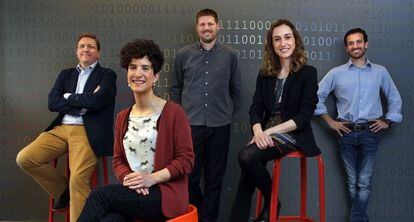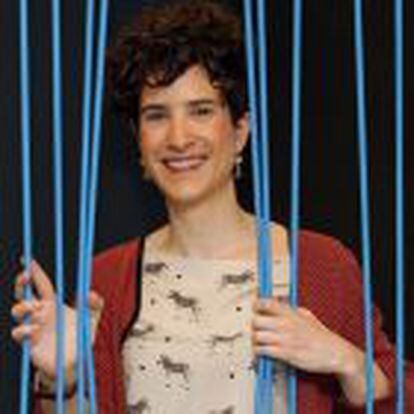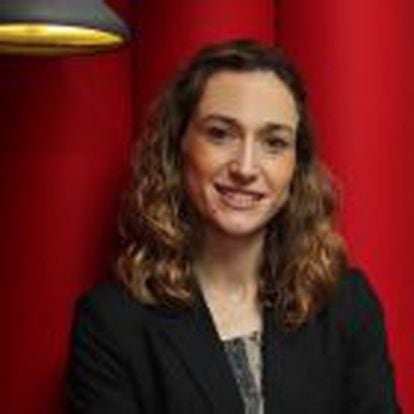How I got hired at Google Spain – and it wasn’t with a tech background...
EL PAÍS talks to people at the company’s Madrid HQ with little knowledge of computing


The strange questions posed to candidates during selection processes at Google are not just a myth. Until a few years ago, being asked how many ping pong balls would fit in a double-decker bus was one of the logic puzzles that a hopeful would have to work out in front of their interviewer. The objective was to analyze their ability to cope with a previously unknown problem.
The approach attracted such interest that in 2012 a US author, William Poundstone, published the bestseller Are You Smart Enough to Work at Google? It was a guide that detailed some of the more common logic questions the company would present in its interviews.
Google’s four-stage interview process
Prospective candidates must apply through Google Careers. The first interview will be via a telephone conversation in English.
Candidates who pass this test then undertake four interviews, the first of which is normally the head of the department the applicant is interested in joining, then another with that person’s boss, another with somebody in a similar post, and finally one with somebody from a different department. In each interview, typically carried out by people of different nationalities and gender, Google is looking for the following qualities:
- Googleyness: This looks at the ability of a candidate to fit into the company's culture, based either on team spirit or preference for self-teaching, among other qualities.
- General cognitive ability: This consists of a series of questions about possible challenges and weaknesses related to the business world and the ability to work things out or put together logical arguments.
- Leadership: This is based on questions about problem solving that assess an individual's ability to motivate other team members.
- Technical knowledge of the job: In the words of Javier Martín, head of human resources at Google Spain, this final interview has the least bearing on whether a candidate is chosen or not.
In April 2015, however, the head of human resources at Google, Laszlo Bock, launched Work Rules, a book that argued that this kind of questioning was not conducive to predicting how a candidate would behave in their future work role. In its place, the company implanted other measures, backed by research, that aimed to detect possible reactions of candidates when faced with real situations.
Today, that test, known as General Cognitive Ability, is still part of the process, but now it is more focused on the reality of the world of business, explains Javier Martín, head of human resources for Google Spain. Applicants might typically be asked to estimate how many airliners might be flying over Madrid at a given moment. “We’re not looking for an exact answer, but something that shows how the candidate thinks and works things out and their ability to identify the variables,” he says.
It might surprise some people to learn that the 2.5 million people who apply for a job at Google every year are not judged on their computer technology expertise. “A lot of graduates don't bother applying for jobs with us because they have preconceived ideas. We don't just hire computer programmers or tech geeks,” adds Martín.
But Spaniards thinking of joining the company will need to speak very good English, says Martín, adding that the 200 employees who work out of Google’s Madrid office on the 26th floor of the Torre Picasso use English for around half of their daily communication.
What’s more, there’s no point sending in a CV or calling Google if you’re interested in working for the company: use Google Careers to see which departments or cities might interest you.
Once in the company, employees can apply for three-month stays in any of Google’s 70 offices around the world, located in 40 countries. In 2015, 10 percent of the Spanish workforce did so. “We encourage our people to change their role every two years, which means constant training and skills acquisition. Each worker receives at least 10 hours of courses a month,” says Martín.
EL PAÍS talked to four members of Google’s Madrid team who prove that a background in the arts or having little technological training is not an obstacle.

Fran Ruiz (49), director of international relations
I never thought I would get the job. My background is in the arts
On August 24, 2006, the cover story of The Economist changed the direction of his career. The article, entitled Who Killed the Newspaper, predicted the demise of print media by 2043. After almost two decades working for different Spanish newspapers, Fran Ruiz decided to make a change. Two years later he took a three-month course in business management at Yale, paid for by his employer.
When he returned to Madrid he joined an Italian consulting firm and 18 months later was picked by Google. “I went through seven interviews and there were no strange questions in any of them. It was all about my ability to solve problems and to lead people,” he says.
“You have to believe in yourself, and you have to get you language skills up to speed,” he adds, who has now been with the company for six years, during which time he has spent periods at Google’s offices in California, London, Dublin and Paris. “You are assessed on your performance every six months, and they are very demanding, but they are also concerned about your professional development,” he says.

Miquel Trías (32), analyst
I had never though about applying, because I’m not an IT graduate
“Time works in a very different way in Google to other companies. There are changes every six months and the learning curve is daunting,” says Miquel Trias, who joined the company three years ago after completing the first doctoral thesis in Spain in Gravitational Waves, followed by an MBA.
“I soon realized that there was no future in research in Spain,” he says. He says that his two interviews with Google focused on his problem-solving abilities. “I had spent five years of study learning how to deal with complex problems and come up with creative solutions. That’s what physics is about, and they appreciated that, he says adding that in a couple of years he intends to join one of Google’s artificial intelligence teams in the United States.

Anaïs Pérez (32), director of communication
I had no experience in technology
Anaïs Pérez was admitted as an intern to Google’s communication department a couple of years after she graduated. This was 2007, two years after Google opened its offices in Madrid. “They were looking for somebody who knew how traditional media worked and knew how to create newsworthy content,” she says.
After completing a degree in Journalism at Madrid’s Carlos III University, she worked as an intern at a television company, as well as the Cadena SER radio network, and then won a grant to study in Mexico, where she worked for a local newspaper. “My main challenge when I came to Google was to translate unintelligible concepts into everyday language for journalists,” she explains. Seven-and-a -half years later she was appointed head of communication.
During her degree program, Anaïs spent time in Ireland and London improving her English. “When you join Google, you really start learning to use English, and in a few months are able to use it to say anything,” she concludes.

Carmen García (32), strategic accounts manager
I had to reinvent myself and fitted in at Google
A graduate in Industrial Engineering from ICAI, Carmen García took an MBA in India and then worked for more than a year at a bank in New York. “I returned to Madrid for personal reasons and decided to try for Google,” she says.
Carmen says she was chosen for her business experience and adaptability. She had also worked in a start-up, as well as having worked for Deloitte. She says what she has found most attractive about working for Google is that the company encourages its employees to take risks. “Their philosophy is to try and then measure the results. It’s very hard to get bored here.”
English version by Nick Lyne.










































